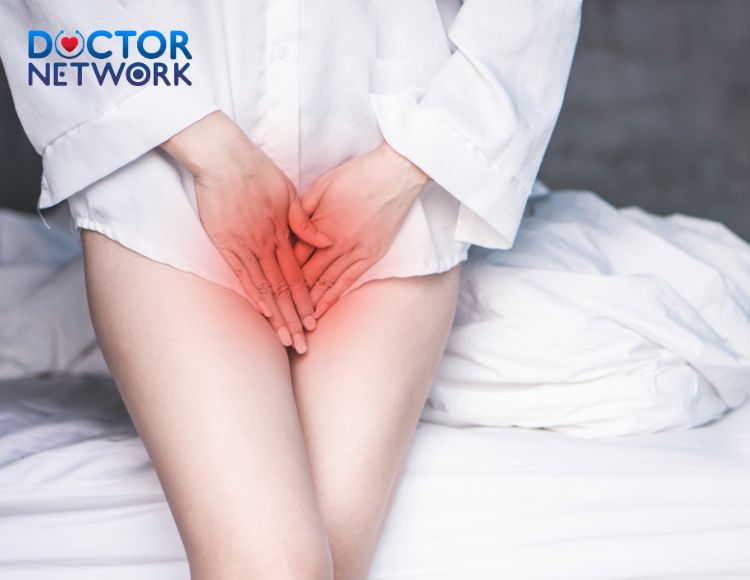Vaginal dryness and reduced lubrication make sexual activity difficult due to pain and decreased pleasure. Understanding the “causes of reduced lubrication during intercourse” is crucial for finding effective remedies and improving the quality of sexual life for both men and women.
Common causes of reduced lubrication during intercourse
1. Physiological Causes
- Vaginal Dryness: A decline in estrogen levels during stages such as menopause, perimenopause, and breastfeeding causes the vagina to lose its natural moisture, leading to dryness and reduced lubrication. Incorrect intimate hygiene practices, such as deep douching and overuse of strong cleansing products, can also disrupt the healthy vaginal environment.

“causes of reduced lubrication during intercourse” – Vaginal Dryness
- Reduced Sexual Desire: A decrease in libido can lead to ineffective arousal and insufficient lubrication. Common causes include psychological stress, and side effects of medications used to treat allergies, asthma, and other conditions.
- “causes of reduced lubrication during intercourse” – Insufficient Foreplay: Foreplay is crucial for increasing arousal and stimulating the Bartholin glands to secrete vaginal fluid. Inadequate or too short foreplay can result in painful intercourse due to lack of lubrication.
2. Pathological Causes
- Genital Infections: Infections such as yeast infections, bacterial vaginosis, and vaginitis can cause dryness, burning sensations, and interfere with natural lubrication.
- Medication Side Effects: Antidepressants, antihypertensives, allergy medications, and cold remedies can cause dryness of mucous membranes, including the vagina.

“causes of reduced lubrication during intercourse” – Genital Infections
- “causes of reduced lubrication during intercourse” – Other Medical Conditions: Conditions such as Sjogren’s syndrome (dry eyes and mouth) and diabetes can cause changes in the body that affect the moisture of mucous membranes, including the vagina.
3. Psychological Causes
- “causes of reduced lubrication during intercourse” – Psychological Stress: Stress and pressures from work and life can disrupt hormonal balance, reduce sexual desire, and make lubrication more difficult.
- Anxiety Disorders: Persistent anxiety not only affects mood but also leads to physiological changes such as vaginal dryness and decreased libido.
4. Unhealthy Lifestyle Habits is “causes of reduced lubrication during intercourse“
- Substance Abuse: Excessive consumption of alcohol and smoking can reduce blood circulation and cause dehydration, leading to decreased vaginal lubrication.
- “causes of reduced lubrication during intercourse” – Poor Diet: A lack of essential nutrients, particularly vitamins and minerals, can affect reproductive health and hinder the functioning of endocrine glands.
Solutions to improve vaginal lubrication
1. Treating and Addressing Underlying Causes:
- Hormonal Changes: Doctors may prescribe estrogen supplements for cases of vaginal dryness due to hormonal changes.
- Infections: Genital infections need to be treated thoroughly with prescribed medications.
- Medication Adjustments: Consult with a doctor to adjust medications that may be causing vaginal dryness.
- Psychological Counseling: Therapy can help resolve anxiety and stress.
- Healthy Lifestyle Changes: Ensure adequate sleep, a nutritious diet, and regular exercise.
2. Immediate Support Solutions:
- Lubricants: Choose water-based, unscented, and safe lubricants.
- Increased Foreplay: Allow more time for arousal to enhance natural lubrication.
- Communication with Partner: Open dialogue helps both partners understand each other’s needs and improve sexual satisfaction.

“causes of reduced lubrication during intercourse” – Communication with Partner
Preventing reduced vaginal lubrication
- Regular gynecological check-ups to detect early signs of health issues.
- Proper intimate hygiene, avoiding deep douching.
- A balanced diet with foods that support female hormones, such as soy and cruciferous vegetables.
- Regular exercise to improve blood circulation.
- Building a healthy lifestyle to minimize stress.
Frequently asked questions about “causes of reduced lubrication during intercourse“
Here are 5 question related to the topic “causes of reduced lubrication during intercourse”
1. Is reduced vaginal lubrication always due to a medical condition?
Answer: While conditions like genital infections, medication side effects, and diseases like diabetes can cause vaginal dryness, it can also stem from non-medical factors. Stress, reduced libido, substance abuse, and poor diet also impact vaginal lubrication.
2. Does reduced lubrication affect fertility?
Answer: Vaginal lubrication doesn’t directly affect fertilization, but it plays an important role. Lubrication reduces vaginal acidity, facilitating sperm movement and survival to reach the egg. Safe lubricants can assist in cases of vaginal dryness.
3. Is vaginal dryness only a problem for older women?
Answer: Although vaginal dryness is more common in postmenopausal women due to hormonal imbalances, younger women can also experience it. Factors like stress, anxiety, medication side effects, substance abuse, and improper intimate hygiene increase the risk.
4. Are there natural methods to improve lubrication?
Answer: Alongside treating underlying “causes of reduced lubrication during intercourse“, natural methods can improve vaginal moisture:
– Increase intake of foods rich in natural estrogen like soy and nuts.
– Stay hydrated.
– Limit alcohol and tobacco use.
– Manage stress and anxiety.
– Regular exercise.
– Ensure adequate foreplay.
5. Is it harmful to use lubricants frequently?
Answer: Using lubricants is a safe solution for “causes of reduced lubrication during intercourse“. However, opt for water-based, unscented products with a pH suitable for the vagina. Avoid lubricants with fragrances, glycerin, or mineral oil to reduce the risk of infections.
Scientific evidence related to “causes of reduced lubrication during intercourse“
Here are some scientific evidence related to “causes of reduced lubrication during intercourse”
Vaginal Dryness:
– **Estrogen and Hormonal Changes:** Up to 90% of postmenopausal women experience vaginal dryness. 40-50% of breastfeeding women also suffer from dryness. Estrogen therapies, such as vaginal tablets or topical creams, improve vaginal moisture and sexual function in menopausal women.
– **Stress:** Stress can reduce sexual desire and affect vaginal lubrication. Relaxation techniques like yoga and meditation can alleviate stress and improve dryness.
Reduced Libido:
– **Anxiety Disorders:** Women with anxiety disorders have a higher risk of vaginal dryness. Psychological therapy can improve sexual desire and reduce anxiety.
– **Medication Side Effects:** Some medications, including antidepressants and antihypertensives, cause vaginal dryness. Discussing alternative options or adjusting dosages with a doctor is advisable.
Genital Infections:
– **Yeast Infections:** These are a common cause of vaginal dryness. Antifungal treatments, either oral or vaginal, can alleviate the condition.
Conclusion
Understanding “causes of reduced lubrication during intercourse” is crucial for effective treatment. Consulting with a healthcare provider to identify specific causes is necessary for appropriate intervention. Mutual understanding and communication between partners also play a key role in addressing the issue and maintaining a fulfilling sexual relationship.
References:
https://www.healthline.com/health/womens-health/watery-discharge
Kiểm Duyệt Nội Dung
More than 10 years of marketing communications experience in the medical and health field.
Successfully deployed marketing communication activities, content development and social networking channels for hospital partners, clinics, doctors and medical professionals across the country.
More than 6 years of experience in organizing and producing leading prestigious medical programs in Vietnam, in collaboration with Ho Chi Minh City Television (HTV). Typical programs include Nhật Ký Blouse Trắng, Bác Sĩ Nói Gì, Alo Bác Sĩ Nghe, Nhật Ký Hạnh Phúc, Vui Khỏe Cùng Con, Bác Sỹ Mẹ, v.v.
Comprehensive cooperation with hundreds of hospitals and clinics, thousands of doctors and medical experts to join hands in building a medical content and service platform on the Doctor Network application.

























